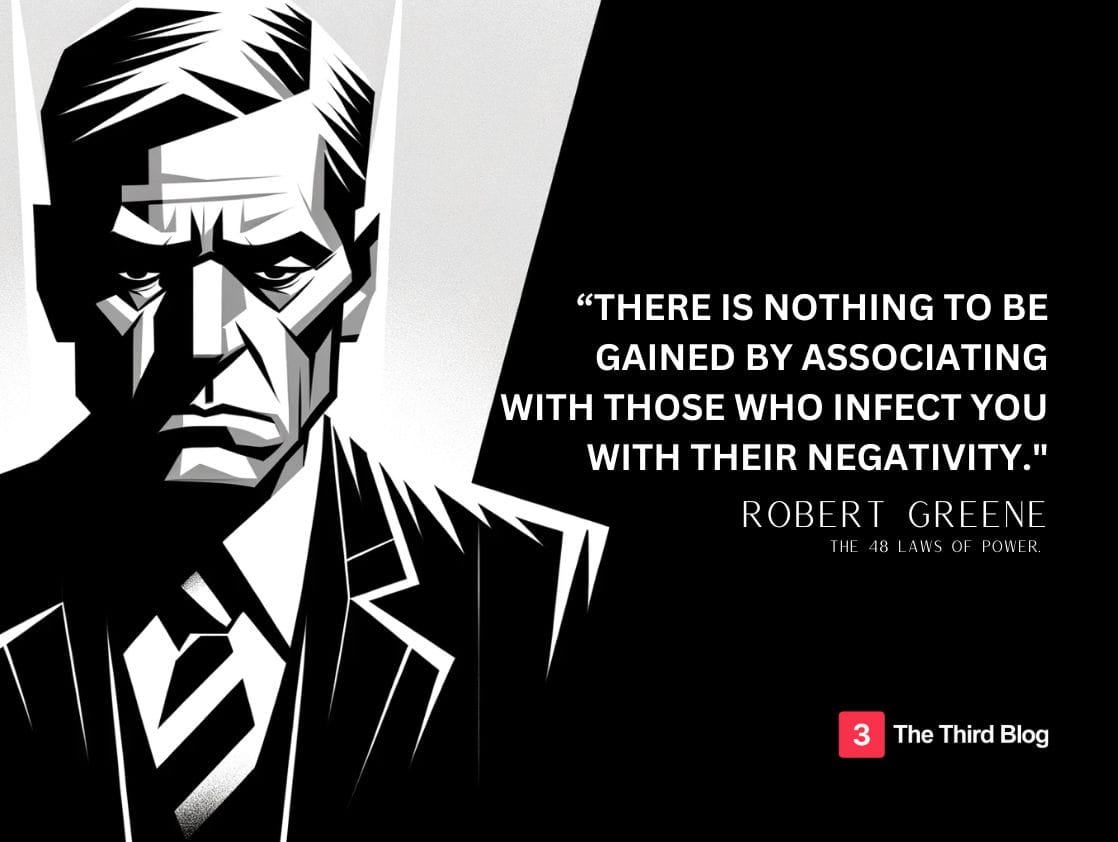Navigating Negativity: Applying Robert Greene's Law 10 in the Workplace
Robert Greene's Law 10 advises avoiding the perpetually unhappy or unlucky in the workplace. Emphasizing positive associations and fostering a constructive environment enhances professional success, while being mindful of others' influence on your outlook and achievements.

In "The 48 Laws of Power," Robert Greene presents Law 10: "Infection: Avoid the Unhappy and Unlucky." This law, while seemingly harsh, holds profound wisdom for navigating the professional world.
Today I'll explore how you can refer to this law in the workplace. Although we don't always have influence over who we work with, we can be strategic in HOW we choose to work. Lets go:
Understand the Law:
Greene's Law 10 advises steering clear of those who are perpetually unhappy or unlucky. The rationale is that negativity and misfortune can be contagious, affecting your own outlook and success.
"There is nothing to be gained by associating with those who infect you with their negativity. The unfortunate sometimes draw misfortune on themselves; they will also draw it on you." - Robert Greene

Application in Business:
- Choose Your Company Wisely: In business, associate with people who are positive and successful. Their outlook and habits can influence and elevate your own.
- Cultivate a Positive Environment: Foster a workplace culture that emphasizes positivity and resilience. Discourage constant negativity, as it can demoralize the team.
- Manage Relationships Strategically: Be cautious in your professional relationships. While empathy is important, avoid getting deeply involved with consistently pessimistic colleagues.
- Lead by Example: As a leader, set a positive tone. Your attitude can set the precedent for your team's morale and outlook.
- Encourage Constructive Feedback: While avoiding negativity, promote an environment where constructive feedback is valued. This helps in addressing issues without fostering a culture of complaint.
What Not to Do:
- Don’t Be Insensitive: Avoiding negative people shouldn’t translate into insensitivity. Be compassionate, but maintain professional boundaries.
- Don’t Foster a Toxic Positive Culture: While it’s important to avoid negativity, don’t create a culture where employees feel pressured to suppress genuine concerns.
- Don’t Isolate Yourself: Avoiding negativity doesn’t mean isolating yourself. Networking and collaboration are key in business.

Managing Negativity in Leadership Roles
What if you find yourself in a leadership position managing people who are consistently negative or unhappy?
Here are some strategies:
- Open Communication: Initiate honest and empathetic conversations. Understand the root causes of their negativity or unhappiness. Sometimes, just being heard can make a significant difference.
- Set Clear Expectations: Make it clear that while you understand and empathize with their feelings, a certain level of professionalism and positivity is expected in the workplace.
- Provide Support and Resources: Offer resources such as counseling, workshops, or training that can help them cope better with their challenges.
- Lead by Example: Demonstrate positivity and resilience. Your attitude can have a significant influence on your team's morale.
- Foster a Positive Environment: Encourage team activities that build a positive work culture. Celebrate successes and recognize individual contributions.
- Monitor and Provide Feedback: Regularly monitor their behavior and provide constructive feedback. Highlight improvements and discuss areas that need further development.
- Decisive Action if Necessary: If the negative behavior persists and affects the team's morale and productivity, you may need to take decisive action, which could range from formal warnings to reassignment or even termination, depending on the severity and impact.
By adopting these strategies, you can manage negative or unhappy employees more effectively, turning potential challenges into opportunities for growth and improvement in the workplace.
By applying Law 10, you might be able to navigate the professional world more effectively, choosing associations that uplift and support your path to success, while maintaining a balance of positivity and realism in the workplace.
Try it out and see where you go.
T3B

